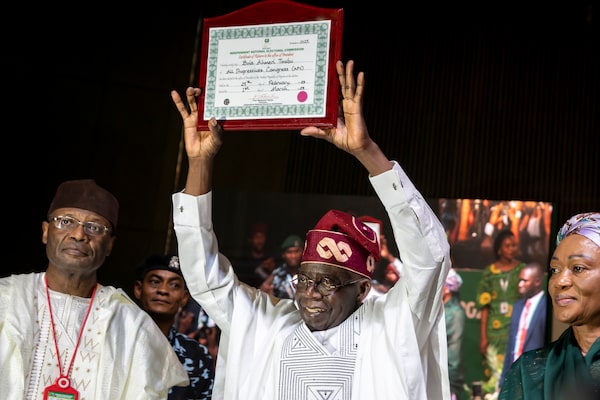
President-Elect Bola Tinubu displays his certificate, accompanied by his wife Oluremi Tinubu, right, and chairman of the Independent National Electoral Commission (INEC) Mahmood Yakubu, at a ceremony in Abuja, Nigeria on March 1. Election officials declared Tinubu the winner of Nigeria's presidential election Wednesday, keeping the ruling party in power in Africa's most populous nation.Ben Curtis/The Associated Press
Robert Rotberg is the founding director of the Harvard Kennedy School’s program on intrastate conflict and the author of books including, most recently, Overcoming the Oppressors.
Nigeria, the African country called sick by even a presidential candidate, appears destined to remain that way, at least for now. This week’s contested election of Bola Ahmed Tinubu as president – with less than a third of the total vote in the continent’s most populous country – presages little fundamental change from the underwhelming, sclerotic presidency of Muhammadu Buhari.
Mr. Buhari had campaigned vigorously in 2015 to bring an inglorious end to the country’s infamously rampant scourge of corruption, both grand and petty, but things are worse now than they were then. Peter Obi, the 61-year-old former Anambra State governor backed by the weak Labour Party, campaigned for real change and became the favourite among young people – but he finished a disappointing third. Former vice-president Atiku Abubakar, 76, represented the Peoples Democratic Party, and came in second.
Mr. Tinubu – the 70-year-old Muslim former governor of Lagos State, representing Mr. Buhari’s ruling All Progressives Congress party – promises to wield a limp duster rather than a stiff broom. It is not clear that the president-elect will have the desire or ability to squelch the takings of the politicians and gangs who profit so readily from the speculation, influence-peddling, extortion and large-scale criminalized procurement fraud that ARE all too common in Nigeria. Indeed, Mr. Tinubu had to forfeit US$460,000 to the United States Treasury in the 1990s, allegedly for depositing narcotics-trafficking profits into U.S. banks. And both he and runner-up Mr. Abubakar are very wealthy, even by the generous standards of Nigeria’s political elites.
Mr. Tinubu, who is a member of the Yoruba ethnic group and hails from southern Nigeria, likely benefited from regional allegiances; in a high-profile 2022 speech, he declared that it was “the turn of Yoruba, it is my turn,” a sentiment that became central to his campaign. Mr. Abubakar is from the north, where Mr. Buhari was from, while Mr. Obi is from the east, apparently failing to benefit from the reputation of his fellow Igbo people as successful entrepreneurs and intellectuals.
Mr. Abubakar and Mr. Obi are now claiming the election was rigged, alleging fraud and mismanagement by the electoral authority and its new computer system. Hundreds of polling places received ballots late, or not at all; some ballot boxes were reportedly stolen, and the sanctity of the official counting process was never assured.
These weaknesses were compounded by Mr. Buhari’s decision to invalidate larger-denomination naira, the national currency, without ensuring that there were enough replacements available in banks and ATM machines – and to do so on the eve of the election. That massive glitch may well have prevented potential voters from paying bus or taxi fares to polling stations, and infuriated much of the electorate.
The president-elect now faces even more ominous challenges. Nigeria can no longer feed itself; the country is geographically one-third larger in size than Texas, but has a massive population of more than 220 million and growing. It has to import nearly all its gasoline and diesel, even though it produces more petroleum than any other African nation and ranks as one of the largest producers in the world. It has few refineries, so it is reliant on countries such as Russia. Nigeria’s government also subsidizes gasoline at the pump, worsening its accounts and encouraging the profitable smuggling of refined fuel into neighbouring countries.
As well, Nigerians are feeling unsafe, amid fears of bandits who kidnap people travelling by road or rail. Last March, a busy train travelling between the capital of Abuja and Kaduna State in the north was attacked, and more than 50 people were held hostage; it took until October for them to be freed. The big cities of the north and south, along with many rural areas in-between, are afflicted by the same issue. The decade-old Boko Haram insurgency has also cost more than 10,000 lives.
Serious political challenges await, too. An Igbo-led separatist movement is trying to recreate the breakaway state of Biafra. Further, criminal forces have been purloining oil from pipelines near the Gulf of Guinea, while pirates in the gulf are hijacking tankers carrying crude oil. There are also battles for land between Fulani herders and settled agriculturalists in the Middle Belt and near Abuja.
Given these many governance crises, Nigeria is considered a failed state, and only the best leadership can save it. Whether Mr. Tinubu has the will or skills to give Nigeria back its greatness will be the key question of his presidency – for his own divided people, and for the rest of Africa.